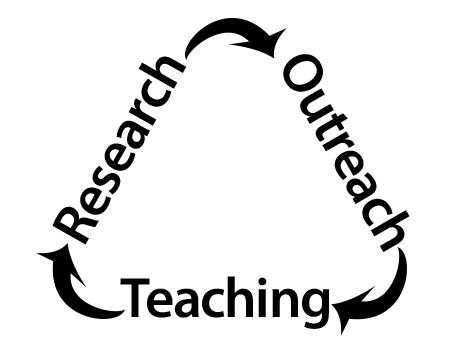Research, Outreach, Teaching
Today's big challenges require solutions where disciplines work together to meet human needs. Race relations are in tension. Global economies are changing. Climate change is creating challenges to our way of life. Chronic health problems like diabetes and obesity are nearing epidemic levels.
These challenges require a new way of thinking and a cross-disciplinary perspective. Our seven departments, interdisciplinary programs, and multiple centers train students to understand that human solutions involve an understanding of the economic, political, and cultural conditions that influence human thought and behavior.
We take an integrated three part approach to these interdisciplinary solutions by:
1) creating cutting edge research that cross-cuts disciplines
2) providing novel teaching and instruction in the classroom that connects these disciplines for students
3) outreaching students to community partners and policy makers that moves this research and knowledge into policies and action.
By bringing a community of faculty scholars, graduate and undergraduate students, community partners and policy makers together, we are producing knowledge and training that will provide lasting solutions to today's challenges.
Research
Research is a large component of social and behavioral science. We are one of only few colleges across the country that facilitates research opportunities at the undergraduate level. Both undergraduate and graduate students can work on collaborative research with one of our faculty mentors or even author their own research.
Outreach
Through teaching and research, the College of Social and Behavioral Science provides students with the experience necessary to solve real-world problems even before they graduate. They can take what they've learned and apply it to internships, local government and non-profit organizations, active community research projects, and study abroad programs, which then benefit their career placement opportunities upon graduating.
Teaching
The College of Social and Behavioral Science is home to some of the world's greatest thinkers and academic minds. Our faculty consist of a collection of tireless individuals who excel at both teaching and researching in their respective discipline. They continually receive accolades from students, fellow faculty members, and the university for their dedication and mentoring both in and out of the classroom.

